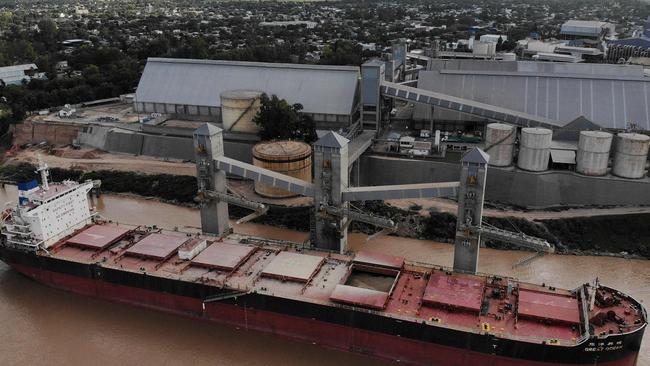Cash crunch drives wild moves in commodities
Banks are demanding big cash payments to trade futures in oil, wheat and gas, resulting in whipsaw price moves in the market.

Commodity traders are being hit by huge cash requests from banks and exchanges, propelling whipsaw moves in markets and hindering the movement of materials beyond Russia and Ukraine.
The outbreak of war sparked steep price changes by clogging commodity shipments in the Black Sea and leading Western importers to shun Russian exports. A vicious financial cycle is exacerbating the volatility and could worsen shortages in some parts of the world, traders say.
Exchanges and the brokerage arms of banks are demanding big down payments, known as margin, from traders in futures contracts linked to commodities such as oil, wheat and natural gas. To avoid the expense of holding on to positions in markets, some companies are unwinding trades, fuelling further price moves.
“Trade that is not even linked to Russia or Ukraine is getting more and more difficult to finance,” said Sebastien Bruyant, a senior portfolio manager at RiverRock European Capital Partners, which lends to commodity traders and producers. He said lenders are withdrawing financing from economically fragile countries such as Egypt and Tunisia to hedge against uncertainty over the length of the war and its economic and geopolitical fallout.
A prominent sign that higher margins are hurting activity: the number of outstanding benchmark Brent and West Texas Intermediate futures falling by more than half this year.
That has fed into wild swings in the price of oil. Brent-crude futures have risen or fallen by 4 oer cent or more on nine trading days since Russia invaded Ukraine on Feb. 24. Prices shot to a 14-year high of almost $US140 a barrel before skidding below $US100 a barrel after margin payments prompted traders to unravel positions. Brent rose back above $US110 a barrel Monday after Saudi Arabia said Houthi forces in Yemen had attacked facilities belonging to state oil company Aramco.
Futures are bought and sold by investors to speculate, and by producers and physical traders to lock in prices, known as hedging. Exchanges charge one payment, known as initial margin, when trades are placed to collect collateral. They then call for or return money each day depending on whether the position gains or loses value.
Exchanges have bumped up both initial and variation margin to account for the increased riskiness in markets. On top of that, traders say they are fielding requests for extra payments from banks including JPMorgan and Citigroup, which act as intermediaries between them and the exchange.
Spokespeople for the banks declined to comment.
“When you’re trying to trade a market based on financial nuances rather than any underlying fundamentals: Anyone’s going to find that tricky,” said Greg Newman, chief executive officer of London-based oil-trading firm Onyx Capital Group.
Escalating margin calls are making it difficult for traders to manage the financial risks involved in moving physical commodities. Some producers and traders in diesel and crude have struggled to find buyers in what are normally routine sales. Among the reasons is that hedging costs have made deals unprofitable, traders say.
A person at one trading house said the initial margins required to hedge some liquefied-natural gas deals had risen to three-quarters of the value of the underlying cargo. In some cases, that has made it economically unviable to ship LNG, the person said.
In a letter to governments, regulators and central banks this month, the European Federation of Energy Traders lobbied for public guarantees so banks would be willing to fund margin calls for traders. A spokeswoman for the group, which says its members include Vitol and Shell, said Friday that discussions were continuing.
Gains in the price of energy, metals and grain have also disrupted a corner of the banking world known as trade finance.
Traders borrow money from banks via letters of credit, revolving credit facilities and other instruments to finance shipments. As the value of each cargo has vaulted, they have maxed out existing facilities or borrowed more money to keep funding cargoes and paying margin.
Trafigura Group, a major oil-and-metals trader, said on March 8 it had opened a $US1.2bn revolving credit facility in record time to cope with an unprecedented rise in commodity prices. Trafigura announced the deal the same day the London Metal Exchange suspended nickel trading after a huge jump in prices fuelled by margin calls.
Even with the backing of its banks, Trafigura’s bonds have come under pressure. A $US500m bond maturing in 2025 traded at about 89 US cents to the dollar Monday, down from US102 cents on the eve of the invasion.
Smaller companies are struggling to convince banks to lend more, say traders and lawyers. One concern for bankers is that commodity prices will slide back, leaving them with inadequate collateral with which to safeguard those new credit lines, said Jolyon Ellwood-Russell, a partner at law firm Simmons & Simmons.
London-based Gapuma Group ships petrochemicals, fertilisers and foodstuffs into Africa from Southeast Asia, Europe and the United Arab Emirates. Founder Jack Bardakjian said he had approached banks asking to double some credit lines and found they were willing to lend just 20 per cent to 25 per cent more.
“There are some huge, huge humanitarian issues that could be developing because of this,” said Mr Bardakjian, pointing to the difficulty of funding shipments of food and fuel into vulnerable African economies, and the ability for consumers to pay the higher costs.
Kristofer Tremaine, chief investment officer of Kimura Capital, a London-based firm that finances physical trading of metals, energy and agricultural products, says blue-chip energy companies pay 6 per cent or more for a line of credit, compared with between 0.25 and 1 per cent before Russia invaded Ukraine.
Among other factors, he said sanctions on Russian lenders Sberbank and VTB Bank have sapped a key source of funding for commodity traders.
The Wall Street Journal


